Categories
- Antiques & Collectibles 13
- Architecture 36
- Art 48
- Bibles 22
- Biography & Autobiography 813
- Body, Mind & Spirit 142
- Business & Economics 28
- Children's Books 17
- Children's Fiction 14
- Computers 4
- Cooking 94
- Crafts & Hobbies 4
- Drama 346
- Education 46
- Family & Relationships 57
- Fiction 11829
- Games 19
- Gardening 17
- Health & Fitness 34
- History 1377
- House & Home 1
- Humor 147
- Juvenile Fiction 1873
- Juvenile Nonfiction 202
- Language Arts & Disciplines 88
- Law 16
- Literary Collections 686
- Literary Criticism 179
- Mathematics 13
- Medical 41
- Music 40
- Nature 179
- Non-Classifiable 1768
- Performing Arts 7
- Periodicals 1453
- Philosophy 64
- Photography 2
- Poetry 896
- Political Science 203
- Psychology 42
- Reference 154
- Religion 513
- Science 126
- Self-Help 84
- Social Science 81
- Sports & Recreation 34
- Study Aids 3
- Technology & Engineering 59
- Transportation 23
- Travel 463
- True Crime 29
The Undying Past
Description:
Excerpt
The mid-day sun beat fiercely on the much-trodden square in front of a provincial railway station. The old white mare nodded drowsily between the shafts of the yellow mailcart which rattled down from the little town to meet every train. Two or three hotel omnibuses, painted brownish-grey, with mud-splashed wheels, also came clattering down the dusty boulevard, at the other end of which rose two stucco towers with their vanes piercing the deep blue of the July sky.
A clanging bell had already signalled the train's departure from the neighbouring station. The station-master put on his red cap, the barmaid began to wipe with a duster the glass case protecting the cheese and other viands, and a couple of postmen crunched over the gravel, wheeling trucks containing letter-bags and parcels.
"Not a single soul inside again," grumbled the restaurant-manager through the waiting-room window, as he watched the hotel omnibus drive up. "What is the use of keeping beer cool if nobody comes to drink it?"
The barmaid nodded meditatively as she flicked the flies from a pile of stale rusks.
Then there came in sight, dashing along the boulevard, an open landau drawn by a pair of spirited bays.
The restaurant-host's face brightened. "The party from Stolten Court!" exclaimed he, seizing his cap. "The young gentlemen's leave is over, then."
The carriage steered clear of waiting passengers with a sweeping curve as it bowled up to the station stairs.
One of the young cuirassier officers who occupied the back seat of the carriage pulled himself slowly erect, and, in all his fair-haired splendour, climbed out, pushing aside with a brusque movement the restaurant-manager, who had officiously thought it necessary to tender his services. The other youth, equally gigantic and fair-haired, and perhaps a trifle more phlegmatic, followed. They threw open on either side the carriage doors, and, with an action of the arm that seemed borrowed from a Court quadrille, assisted the stupendous female form sitting on the front seat of the carriage to alight.
With swelling bosom and wide-spreading hips, her fat hands imprisoned in new light kid gloves, her grey gauze veil thrown back, displaying a snub nose, the lady calmly descended, with a glance over her shoulder of somewhat sharp disapproval at the old gentleman who followed her.
"Leave me alone, boys," he snapped, when his sons would have helped him too. "Your broken-down old father is still able to help himself."
He threw off his dust-coat on the seat behind him, and with an elastic bound sprang down without touching the carriage steps. He stood there, a dapper figure in his short, elegantly cut coat, his little eyes twinkling with self-satisfaction out of a face lined from fast living, the cheeks of which hung down on either side of an aggressively curled-up grey moustache. He had to look up to his wife and sons, who were all more than a head taller than himself.
The party entered the small waiting-room reserved for first-class passengers, which, besides two bare polished tables, and portraits in lithograph, veiled in green gauze, of the county nobility and gentry, boasted nothing but apparatuses for the annihilation of flies; which consisted of a glass bottle full of soapy water, two plates containing poisoned paper, and a few glasses covered with brandy-soaked bread bored with holes. Within and around these traps revolved hundreds of half-drowned and poisoned flies in their last death-struggle....





